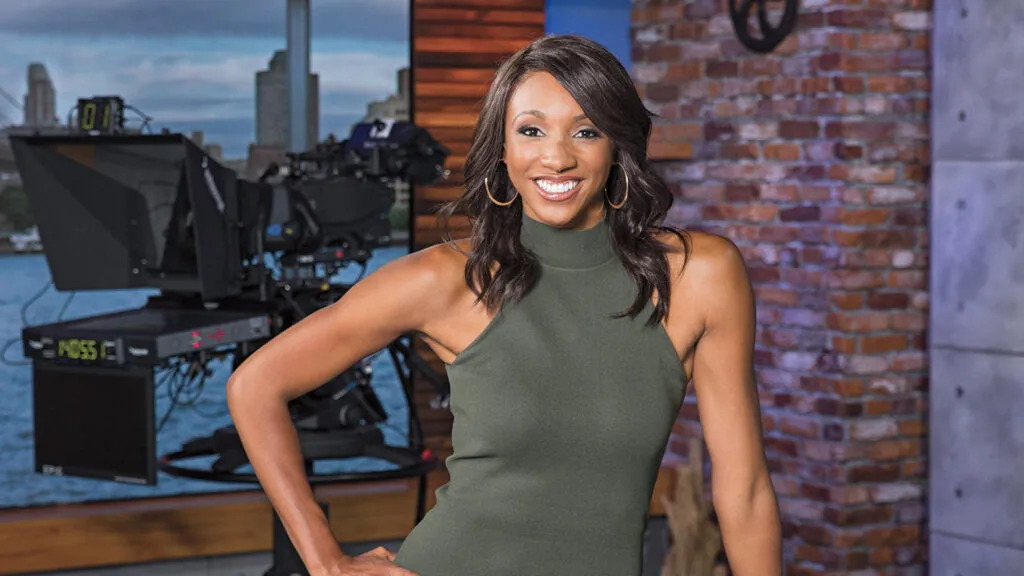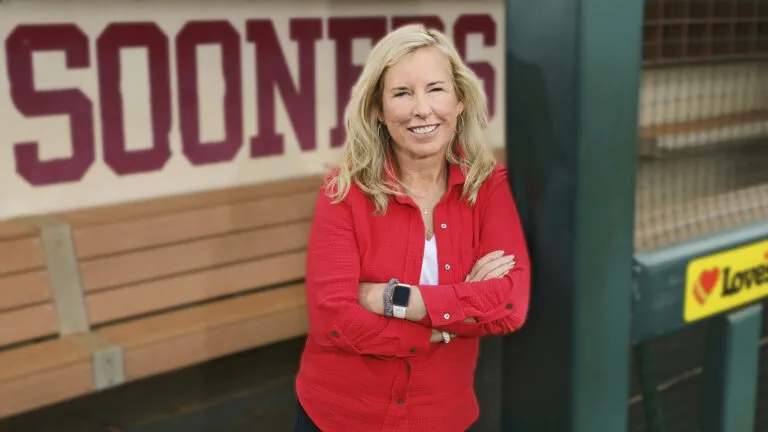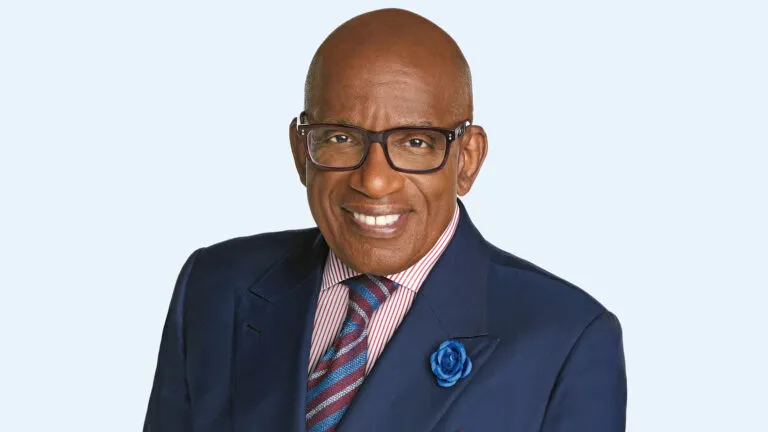Find me on Twitter and you’ll see that I “talk sports for a living on ESPN,” with a photo of me on College GameDay, where I’m a reporter. You’ll also see that I cofounded an organization called the Winning Edge Leadership Academy (more on that later). Most important—and perhaps unexpectedly for some—there’s a Bible reference: Ephesians 2:10, “It is God himself who has made us what we are and given us new lives from Christ Jesus; and long ages ago he planned that we should spend these lives in helping others.”
I put that there for a purpose. People can expend a lot of negative energy on social media. I understand how that happens. I’ve made tons of mistakes—some of them even on air. I’m not immune to criticism or self-criticism. But it seems more important than ever to remember just who we are and what bigger purpose God intends for us.
I inherited a lot of that from my parents. My siblings and I grew up knowing we were very loved and that much was expected of us.
Dad was a big car buff, so just because I was a girl—the middle child—didn’t mean that I shouldn’t know how to change a tire, check the oil and know what’s under the hood. I might have been a little more interested in the inside, like the radio and upholstery, but that didn’t matter. “Every engine is a little different,” Dad said. “Get to know ’em.” When I was 16, he took me up a hill in a 1992 Honda Accord—I called it Putt-Putt. He put me in the driver’s seat and told me to drive. Did I mention that it was a stick shift?
Mom was the CFO for the Institute of Paper Science and Technology at Georgia Tech, but we kids always came first. She never missed a game or parent-teacher conference. Dad worked for the FBI and for a while was commuting from Atlanta to Washington, D.C. I don’t doubt that was stressful, but Mom and Dad made it work. Marriage wasn’t something you messed with. I took after my dad in more ways than one. He was six foot seven, and I topped out at six foot two in ninth grade, fending off nicknames like the Jolly Green Giant. I’d played basketball since sixth grade, and in high school, a coach asked if I’d like to try volleyball. My first thought was: If I play volleyball in the fall, then I can get out of that boring preseason strength training we do for basketball.
“Sure,” I said. It was love at first serve. I was hooked. I was team MVP for three years running and named All-State as a senior. I was recruited for the basketball and volleyball teams at the University of Georgia. It was there, my sophomore year, that I had one of the most important conversations of my life.
It was in the spring—the off-season—and one of my volleyball teammates, who worshipped the sport, came into the locker room in tears. “I need to quit,” she said. “I’m not meant to do this.”
“What?” I asked. I thought maybe, as a freshman, she was discouraged. “Your first year can be tough,” I said. No, it was nothing like that. She still loved the game, but she sensed that God had something else in mind for her.
“I’m supposed to become a teacher. I’m meant to help kids,” she said. She realized through prayer that volleyball was no longer in God’s plan for her life. The pressures and time commitment were taking focus away from worshipping God and his new purpose for her.
It seemed so outlandish, so impossible. That faith in God would trump everything, even volleyball. I knew how much being an NCAA Division I athlete meant to her. I’d heard about people whose lives were guided by what they believed. This was the first time I met it face-to-face, in my locker room, in someone my age no less. Her face was aglow with strength and clarity of purpose. I looked at her and thought, I want what she has. To live like that.
I became more intentional about my faith. I read the Bible. I joined a Bible study. I prayed a lot and sought out a church. Sports were still important—and still are. But I came to see how the wins and losses of life were so much more manageable when you had a real relationship with a higher power.
That helped me make the transition from playing sports to talking about them. I went into broadcasting after college, working my way up the ladder. My first football assignment for ESPN was a game on ESPNU, where Arkansas was facing a nonconference team they would likely destroy. That’s probably why a rookie like me got the assignment. I was so nervous that I had my finger on the mic’s talk-back button. Only the producer could hear me. Colleagues in the truck shouted into my ear monitors, “Let go of the talk-back button! Nobody can hear you.” They had to take me off the air.
I was devastated. Stewed about it for weeks. How could I have made such a silly mistake? Finally, I made a rule for myself. If I made a mistake, I could wallow in self-pity and rake myself over the coals. But only for eight hours. Eight hours to ask God what I’m supposed to learn, eight hours to contemplate whatever lesson it was. Then move on. I’ve managed to do that. Mostly.
There was another TV flub—you can find it online. I was at the 2016 Rose Bowl game (the Rose Bowl!) on a sun-drenched January day in Pasadena, California, interviewing Stanford running back Christian McCaffrey. I was trying to say productivity and it merged with another word in my head and out popped a new word—one you won’t find in any dictionary: productition.
“ESPN Reporter Invents Awesome New Word” went the headlines. I posted a few laughing-till-I’m-crying emojis on Twitter with what I hoped was a playful explanation: “‘Productition’ definition: the combination of production and productivity on a level most humans can’t achieve…”
Mom had come to Southern California with me, and the two of us stuck around for a couple of days to enjoy the beach. I kept going on and on about that stupid thing I’d said. So much for my eight-hour rule. Finally Mom burst out, “No one else cares. Let it go!”
Letting go of something and making the right choices in life mean to continually ask myself, Is this what God wants? Is this God’s purpose for me? Last year, I really discovered how important those questions could be. I was turning 30. All my friends were getting married. I had been going out with a great guy. He seemed like the one. He popped the question; I said yes. He gave me the ring. We booked the church.
Our minister insisted that we do premarital counseling for nine months. We had one session in person and several more Skype sessions. He had us read a book and answer important questions. I bought the dress, we sent out the invitations and we picked the food, the flowers, the bridesmaids’ dresses, our favorite Bible passages.
Yet something was wrong, and I tried to ignore it. Until one month before my wedding, at a bachelorette party for a close friend. I could see it in her deep-down joy, hear it in her voice when she talked about her soon-to-be husband. It was like the love my parents had, the kind of love and trust that sustains a marriage through life’s challenges. What I had with my fiancé was not the same. God was telling me something. I had to listen. This was not the man I was supposed to marry. I spent the night in tears and prayers.
I called my fiancé and told him, one of the hardest things I’ve ever had to do. I called our pastor, who said, “I’ve been praying for discernment for you. You made the right decision.” I called our wedding planner, my friend Shelley. “Don’t worry about it,” she said. “Your mom and I will undo everything.” And they did. I hated to think of all the wasted money. I volunteered to send refunds to the people who had already sent wedding presents—they refused. My wedding dress still sits in Mom’s closet, and I can barely look at it. But as one divorced friend later confided, “I walked down the aisle knowing it was wrong, but I felt I was in too deep.” That could have been me.
“It is God himself who has made us what we are and given us new lives…” goes that verse from Ephesians. New lives—as long as we truly pay attention.
On the wedding weekend, I went off to New York by myself and had one of the best weekends of my life. I got to shadow Robin Roberts on Good Morning America and get her advice on my career. This was the same summer I got the promotion of a lifetime, this job that I love on College GameDay, as the first African-American female reporter on the college football pregame show every Saturday during the season.
In 2018, I was able to go back to the Rose Bowl and interview Oklahoma Sooners and Georgia Bulldogs. I was thrilled to see my alma mater win. I’m happy to report there were no manufactured words on the air.
That Ephesians quote emphasizes something else very important to me: “that we should spend these lives in helping others.” It’s why my friend Corinne Milien and I started the Winning Edge Leadership Academy—or WE Leadership, our shorthand for it on Twitter. We’re dedicated to mentoring young women and minorities in the professional sports business. Mentoring others as I have been mentored, helped and encouraged.
Something I tell young people is this: Do that thing you’re called to do. Whatever it is, it will take courage, commitment and lots of hard work. It means learning from your mistakes and moving on, moving forward. Sometimes it means saying no to someone even as you say yes to yourself.
I have some great credentials and a lot to be grateful for. But what I hold on to more tightly than any mic is this: I am God’s creation. Like you. Like all of us. Wonderfully made.
For more inspiring stories, subscribe to Guideposts magazine.





